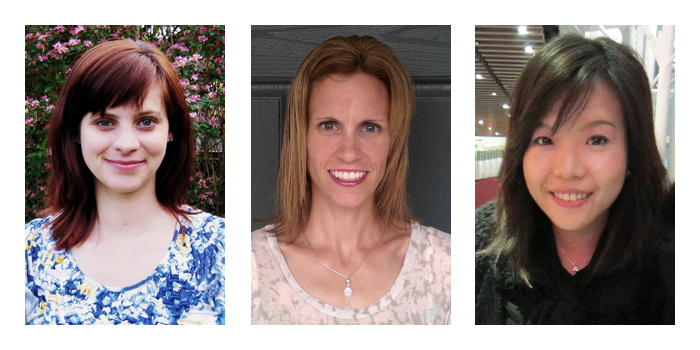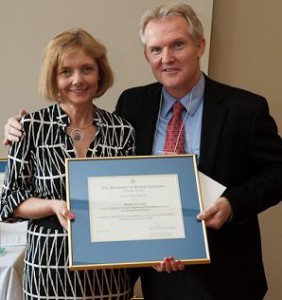
Spring 2012 Grads: L-R: Physical Therapist Rebecca Shook, Physical Therapist Sarah Strickey and Occupational Therapist Sabrina Li
On Wednesday, May 23 these three therapists joined the growing number of Master of Rehabilitation Science graduates. Although only Vancouver-based Rebecca Shook was able to cross the stage at convocation, her colleagues Sabrina Li in Hong Kong and Sarah Strickey in Cary, North Carolina in the U.S. were in touch to share the occasion and prepare the traditional joint valedictorian speech. Please join us in congratulating these graduates and enjoy their celebratory words.
It is both thrilling and surreal to be submitting these remarks as we complete our MRSc journey! This program has followed us all through a multitude of life changes from new jobs to new babies to new countries. This program has remained the constant through all these events. It goes without saying that the nature of this program has allowed us to balance the other aspects of our lives while providing us with an invaluable way to stay current, grow as professionals, and develop practical skills to apply to our clinical practices.
Collectively, we have learned some valuable lessons throughout the course of our studies that are worth sharing.
- Organization pays off
Without good organization of notes, journal articles, to-do lists and references lists from the beginning, we’re not sure we would be completing this now- at least not with our sanity relatively intact!
- No man (or woman) is an island
Completing research in isolation without input from others may seem attractive at first (I get to do it my way, all the time!), but it makes for an inferior product in the end.
- Research’s spill-over effect
Through the process of completing this degree we have also internalized knowledge on evidence-based practice, literature searching, writing and referencing and have gleaned a much greater appreciation of what is required to support new ideas and initiatives in practice.
- Research is fun
There is an inherent thrill in discovering new information (or confirming your own hypotheses) and then writing about it in a manner that makes it accessible for other clinicians. And the fun doesn’t stop there; research findings lead to more questions which drives us all to keep studying!
- Research is challenging
As novice researchers it is easy to underestimate the complexity of conducting research. The amount of discipline and planning that is required to ensure that the integrity of the research is maintained cannot be under-valued.
- Research takes time
It is not a process that can be rushed. Allow more time than seems reasonable for every step and attempt to plan for every foreseeable obstacle
- Buy-in is essential
When developing or improving rehabilitation services, research is important, but ‘buy-in’ from stakeholders is also important! We need to ‘think outside the box’, then try to understand the stakeholders’ needs and use ‘their’ language.
- It’s a small world after all
The greatest advantage of this program is that it can be literally completed from anywhere in the world. The three of us are a testament to that as we cover three countries and two continents. The value of learning from colleagues around the globe has been paramount to our experience.
From our first (admittedly tentative) posts to our final assignments the faculty and staff associated with the MRSc program have encouraged and motivated us to succeed. Without their unwavering support, it would not be possible to complete a program of this magnitude from afar. We would specifically like to thank our major project supervisors, Dr. Lesley Bainbridge, Alison Gerlach, and Sue Stanton, whose guidance and encouragement were instrumental to the success of our major projects. Finally, we wish to thank our families, our friends and our colleagues who supported us in countless ways throughout this experience!
While we have looked forward to completing this degree for quite some time, we also know that we will greatly miss the stimulating discussions we have shared over the years with our fellow learners. Their enthusiasm has continually pushed us to think beyond the boundaries. To all our colleagues who are considering embarking on this journey – go for it; it is a challenging, yet rewarding experience.
Best of luck to all current and future MRSc learners; may you continue to set goals that inspire you!
Sabrina Li, Hong Kong
Rebecca Shook, Vancouver, BC, Canada,
Sarah Strickey, Cary, NC, USA

